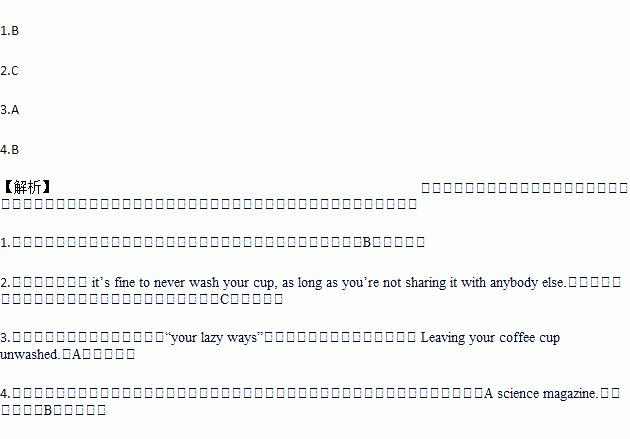题目内容
There are two types of people in this world: those who regularly wash their office coffee cup. And those who only take it off their desk to cover up the coffee mark at the bottom with a fresh pour, driving away their shame with the reasoning that the heat must kill the bacteria or spine thing.
Depending on which type of person you are, this will be either mildly annoying or more-than-mildly exciting. As Heidi Mitchell wrote in a recent Wall Street Journal column, it’s fine to never wash your cup, as long as you’re not sharing it with anybody else.
There are two warnings to that statement, infectious-disease expert Jeffrey Strake, a professor at Baylor College of Medicine, told Mitchell; One, it only applies if you’re not sharing the cup with anybody else. And two , if you leave cream or sugar in your cup over the weekend, that can certainly cause mold(霉) to grow – in which case, wash it out.
Otherwise, though, there’s not really much to worry about. “If I went and cultured the average unwashed coffee cup, of course I would find bacteria.” Starke said. “But remember the vast majority came from the person who used the cup.” Even if you drink from it while sick, it’s pretty hard to re-infect yourself with the same cup; most viruses don’t live long outside the body, which means that just letting your cup live in its own dirt may be a safer bet than the alternative; cleaning it with the disgusting sponge(海绵) in the office kitchen “The sponge in the break room probably has the highest bacteria count of anything in the office.” Starke said if the idea of not washing horrifies you , just stick the sponge in the microwave before using. Otherwise, though, reel free to continue your lazy ways without guilt.
1.What does the passage intend to tell us?
A. It is harmful to drink coffee with sugar.
B. It’s okay not to wash your coffee cup regularly.
C. The hot water contributes to the bacteria growing.
D. Drinking from unwashed coffee cups causes diseases easily.
2.What do we know from Stark’s words?
A. The coffee cup in the office must be put in the microwave to clean.
B. It’s easy to get infected if you often use the same unwashed cup.
C. The coffee cup shouldn’t be shared in the office.
D. It’s good way to grow bacteria in an unwashed cup.
3.What does the underlined part “your lazy ways” refer to ?
A. Leaving your coffee cup unwashed. B. Sticking the sponge in the microwave
C. Using Paper cups only in the office D. Cleaning your coffee cup with sponge.
4.Where does the passage probably come from?
A. A travel brochure. B. A science magazine.
C. An official statement. D. An entertainment program.
 考前必练系列答案
考前必练系列答案

 俗) clearly. Maybe I didn’t need to send any gifts. I watched others to see what they did, so next time I can understand.
俗) clearly. Maybe I didn’t need to send any gifts. I watched others to see what they did, so next time I can understand. for the teacher, so I owed(欠) a gift to the teacher. Anyway, I want to say, ”Thank you, Mr. Peters, and I’m sorry.”
for the teacher, so I owed(欠) a gift to the teacher. Anyway, I want to say, ”Thank you, Mr. Peters, and I’m sorry.”